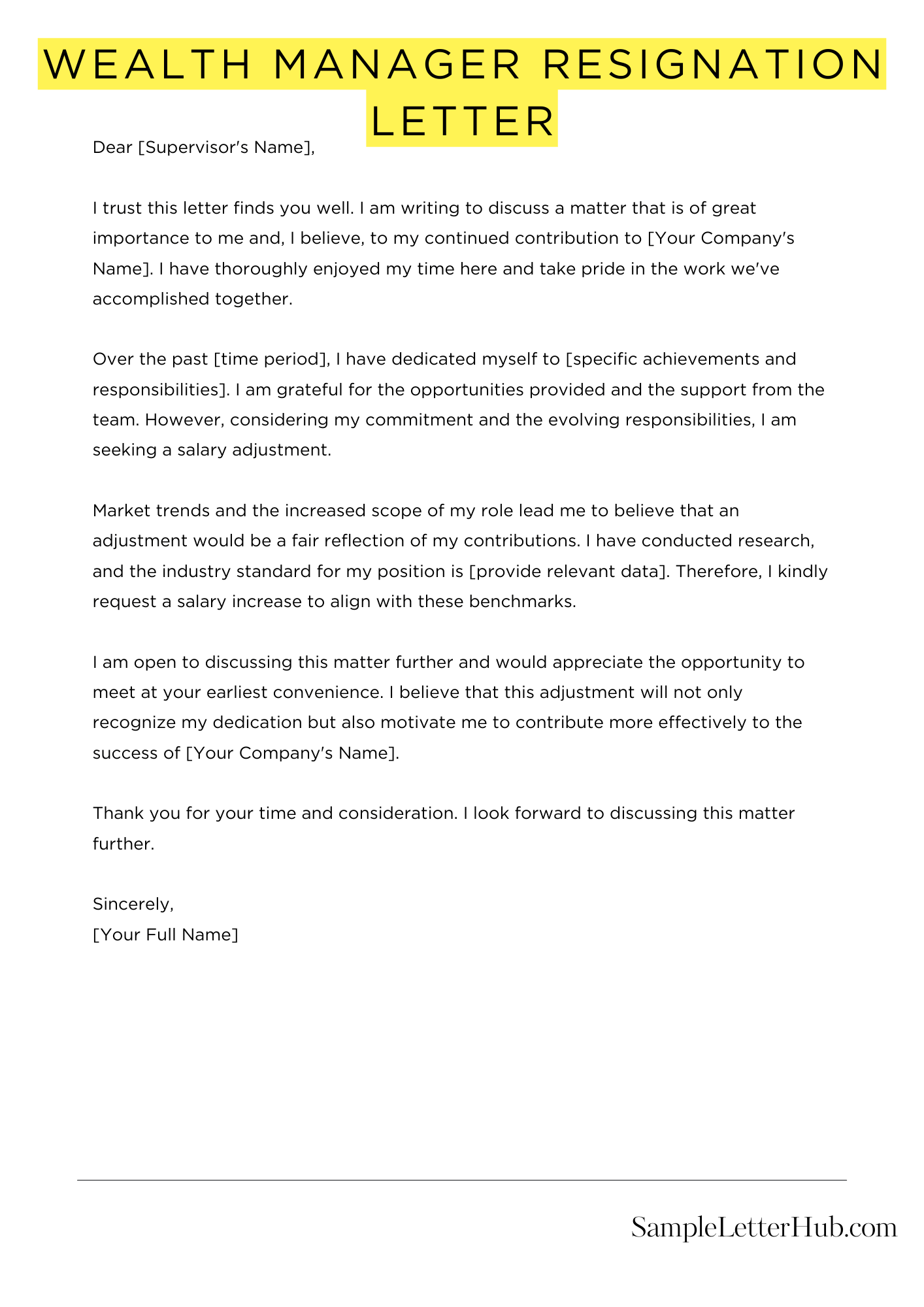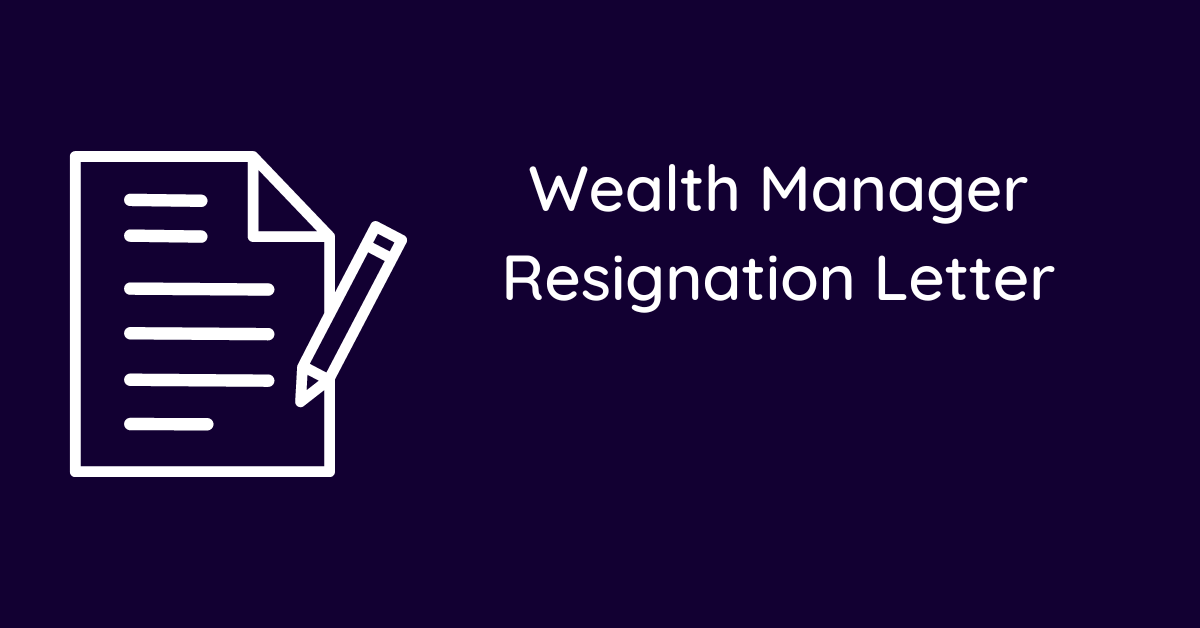If you’re a wealth manager who’s decided to move on, writing a clear and professional resignation letter is a must. It’s a chance to express your gratitude for the opportunity to work at the firm and to explain your reasons for leaving. It’s also an opportunity to leave a positive impression on your former employer.
In your letter, be polite and humble. Thank your boss for the opportunity to work at the firm and for their support. Explain your reasons for leaving in a clear and concise way. If you’re leaving for a new job, be sure to mention the name of the new company and your new position.
Below, we’ve included a template wealth manager resignation letter that you can use as a starting point. Feel free to adapt it to fit your own circumstances.
Wealth Manager Resignation Letter
Dear [Hiring Manager Name],
Please accept this letter as formal notification that I will be resigning from my position as Wealth Manager at [Company Name], effective [Your Last Day of Employment].
During my time at [Company Name], I have gained invaluable experience and developed strong relationships with clients and colleagues. I am grateful for the opportunities and support I have received.
I wish you and [Company Name] all the best in the future.
Sincerely,
[Your Signature]
Short Wealth Manager Resignation Letter Sample
Please accept this letter as formal notification that I am resigning from my position as Wealth Manager at [Company Name]. My last day of employment will be [Your Last Day]. Thank you for the opportunity to grow and learn during my time here. I wish you and the company continued success. I am happy to assist in the transition process to ensure a smooth handover of my responsibilities.
I wish you all the best with your wealth manager resignation letter.
When it’s time to say farewell, expressing your gratitude and best wishes can make the transition smoother:

How to Write a Wealth Manager Resignation Letter
1. Start with a Formal Introduction
Begin your letter with a formal salutation, such as “Dear [Manager’s Name].” Clearly state your intention to resign from your position as a wealth manager at the firm.
2. Express Gratitude and Appreciation
Take this opportunity to express your gratitude for the opportunities and experiences you’ve gained during your tenure. Mention specific projects or accomplishments that you’re particularly proud of.
3. State Your Last Date of Employment
Clearly indicate your last date of employment. This will help your manager plan for a smooth transition.
4. Offer to Assist with the Transition
Let your manager know that you’re willing to assist in any way possible to ensure a seamless handover of your responsibilities. Offer to train your replacement or provide documentation to ease the transition.
5. End with a Professional Closing
Close your letter with a professional and courteous tone. Thank your manager again for the opportunity to work at the firm and wish them and the company all the best in the future.
6 FAQs on Wealth Manager Resignation Letters
Resigning from a wealth management position can be a daunting task. To help you navigate the complexities of this process, here are answers to six of the most frequently asked questions about wealth manager resignation letters:
1. What should I include in my resignation letter?
Your resignation letter should include the following key elements:
* A clear statement of your intent to resign
* Your last date of employment
* A brief expression of gratitude for the opportunity to work at the firm
* An offer to assist with the transition
2. How should I format my resignation letter?
Your resignation letter should be formatted professionally, using a standard business letter format. It should be single-spaced, with one-inch margins on all sides. Use a font that is easy to read, such as Times New Roman or Arial.
3. What should I say in my resignation letter?
The tone of your resignation letter should be professional and respectful. Avoid being negative or critical of the firm. Instead, focus on expressing your gratitude for the opportunity to work there. You may also want to mention your reasons for leaving, but be brief and professional.
4. When should I submit my resignation letter?
It is generally advisable to submit your resignation letter two weeks before your last date of employment. This will give your employer time to find a replacement. However, if you are leaving on short notice, you may need to submit your letter sooner.
5. What if I am asked to stay?
If your employer asks you to stay, you should carefully consider your options. You may want to negotiate a different start date for your new job, or you may decide to stay with your current employer. Ultimately, the decision is up to you.
6. What are some common mistakes to avoid in a resignation letter?
Some common mistakes to avoid in a resignation letter include:
* Being negative or critical of the firm
* Making personal attacks
* Using unprofessional language
* Submitting your letter too late
* Not offering to help with the transition
Before making the decision to resign from your job, it’s essential to consider the legal aspects:
Understanding your emotions after quitting your job is important. Explore why you might be feeling sad:
Related
- Resignation letter sample
- Forced resignation letter
- Resignation letter due to going abroad
- Resignation letter due to marriage
- Resignation letter due to other opportunity
- Resignation letter due to mistake

